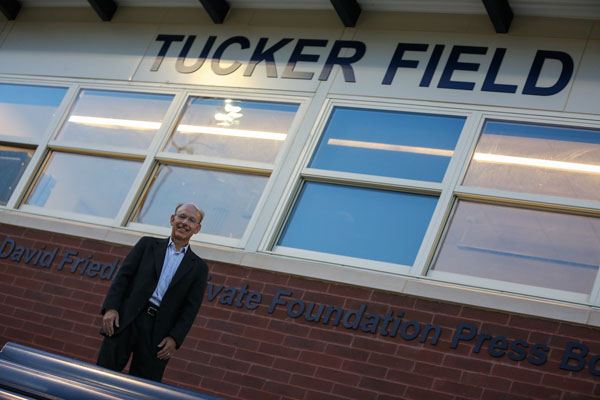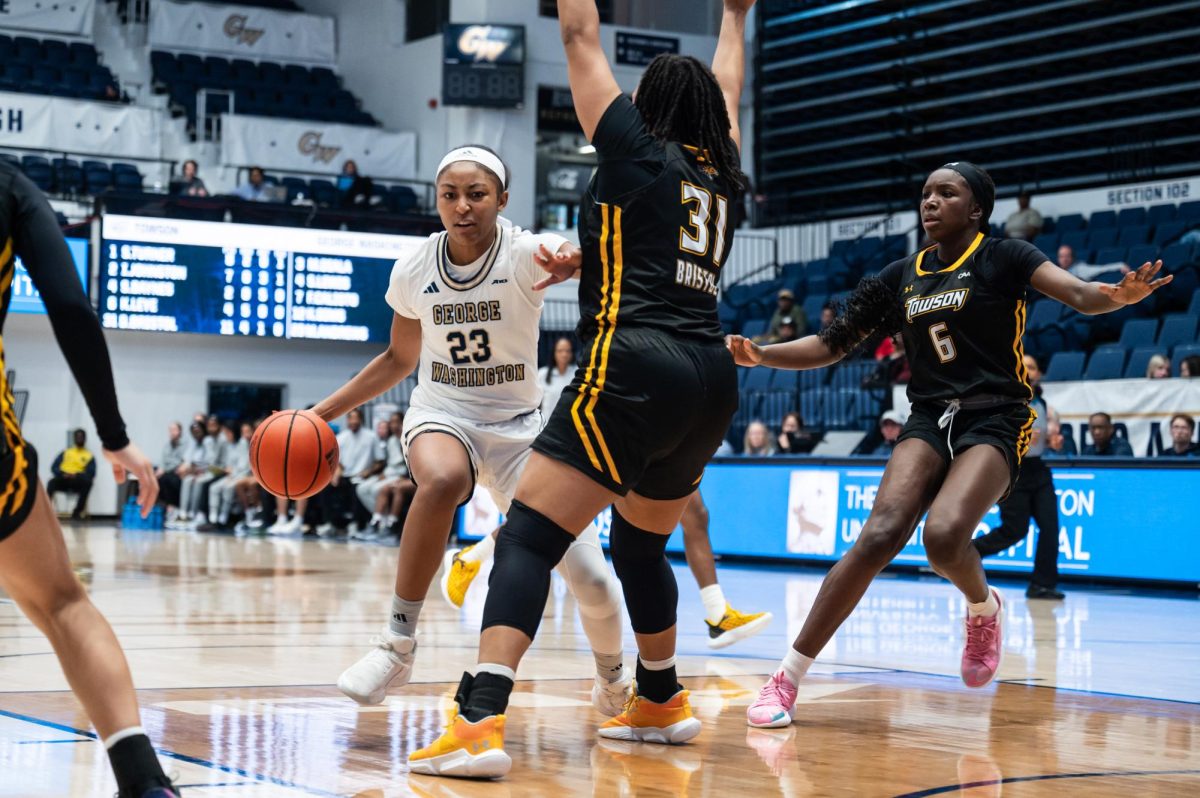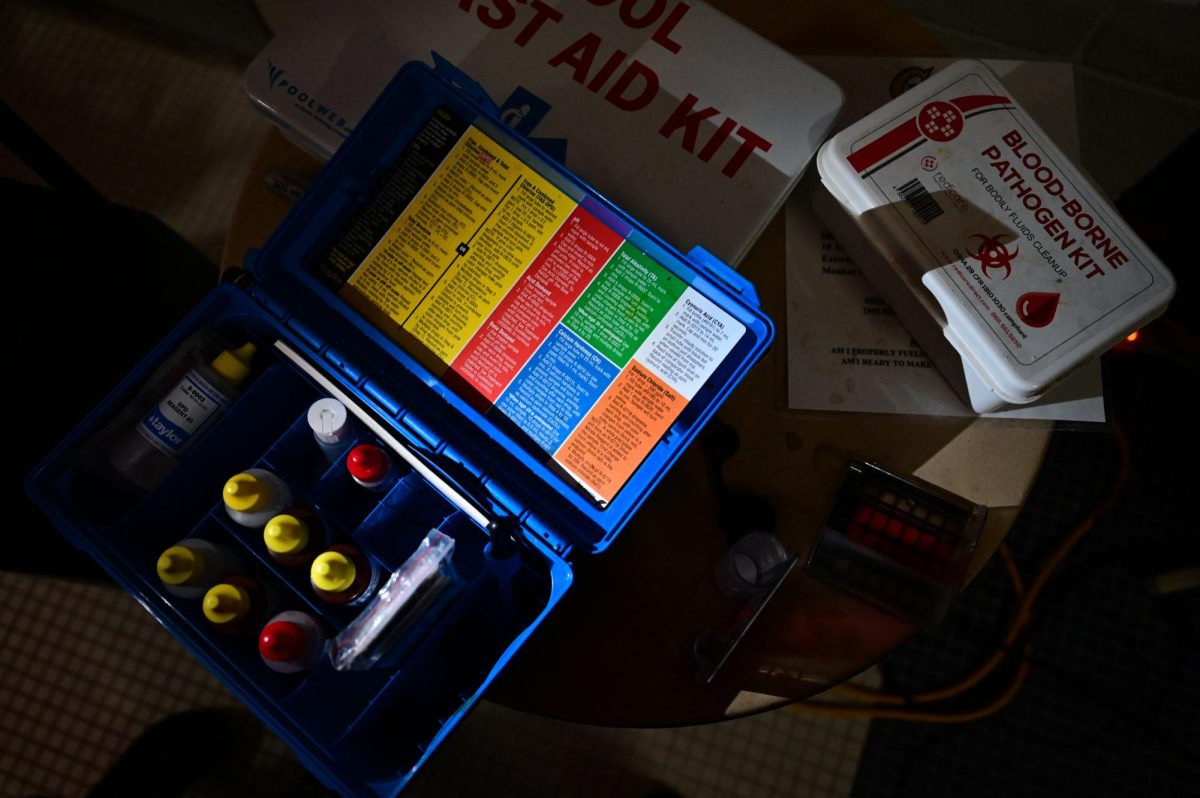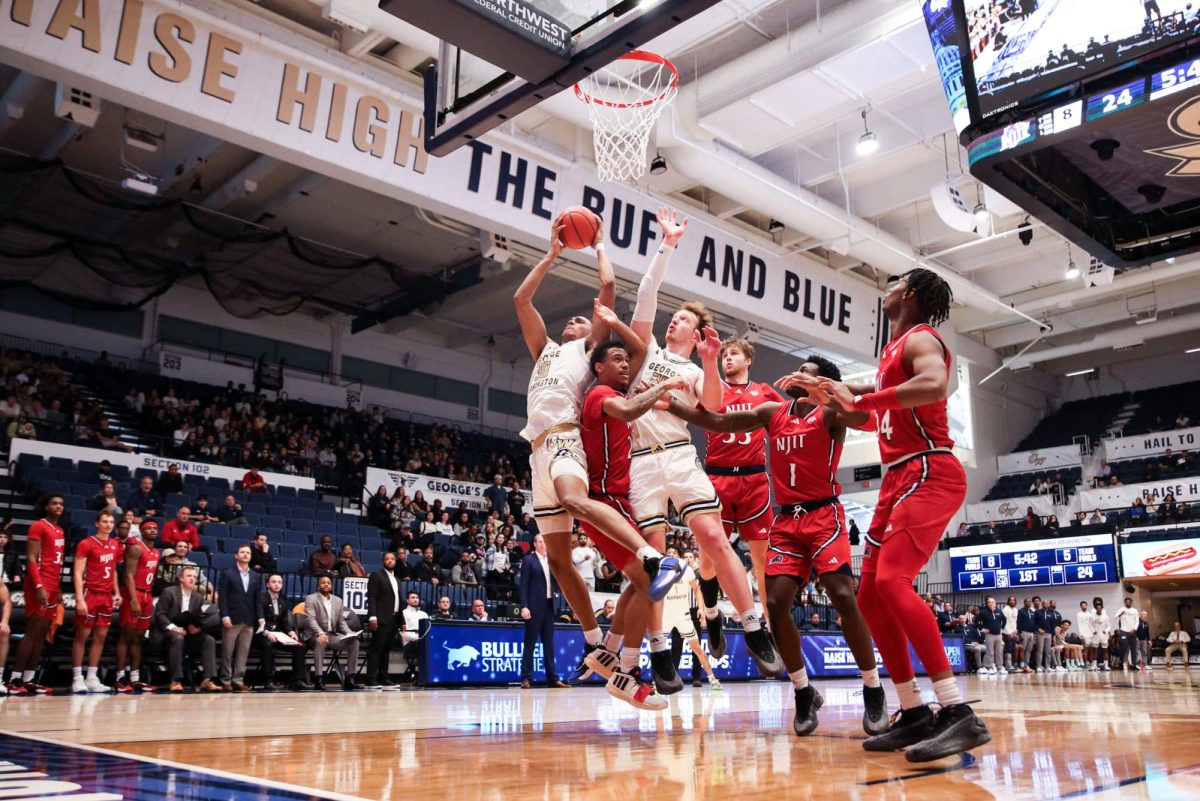The center field wall at Tucker Field at Barcroft Park, where the baseball team will begin hosting its first-ever Atlantic 10 championship Wednesday, is marked as 380 feet from home plate.
No such barriers were in place when the field’s namesake Ave Tucker played on the Ellipse as a speedy center fielder for the Colonials from 1976 to 1977.
Tucker chuckled, reminiscing about tracking down fly balls that should have been home runs on the field. He remembered games stopped for the President’s helicopter to land and how the White House Christmas tree created an unusual obstacle in left field, in an interview in the new press box overlooking the nightcap of GW’s double-header against William and Mary Thursday.
“We didn’t have a fence. We didn’t have a dugout. We didn’t have a batting cage. We didn’t have a press box. We didn’t have food. We didn’t have bathrooms. We had to run across the field about 1,000 feet just to go to the bathroom. Fortunately, we were all pretty young,” Tucker said.
He has fond memories of the odd bounces balls would take and the lack of amenities, but as the years went on, it became clear that GW’s baseball facilities needed an upgrade. Recruits were rarely taken to see the field, for fear that they’d find it a bit too similar to their Little League diamonds.
The athletic department renovated Barcroft Park in 2012, but some key aspects, like a clubhouse, were missing. So the trustee and longtime supporter of the GW School of Business turned his support of the University towards the athletic department with a $1 million donation in October, in part to enhance one of the country’s best college baseball facilities. With the gift, the Board of Trustees voted to name the field in his honor.
“It’s awesome. What timing,” Tucker said. “I’m excited to have a clubhouse here, because I think with a clubhouse, this will really be an amazing facility and it will attract other great, scholar athletes which I think is a goal at GW.”
Tucker graduated with a bachelor’s degree in accounting from the business school and co-founded TM Financial Forensics, a forensic accounting company of which he is now the chief executive officer, in 2010. He has generations of ties to GW, which he said is a school that has always helped people.
Officials let Tucker’s father take GW Law School classes at night so that he could keep his job at the State Department. His mother-in-law studied economics at GW in a time when women were rarely allowed to. And he got his degree from the Business School in 1977 thanks to an athletic scholarship.
So he gave back. Tucker became a longtime supporter of the business school as a member of its advisory council, where he created an endowed chair position. He’s also supported the law school, but growing trust in the trajectory of the athletic department and in athletic director Patrick Nero spurred him to give to athletics.

“I see the athletic department as very important in any school,” Tucker said. “If you want to attract top athlete scholars, you’ll do much better if you have a good athletic program. And I think even — not so much all sports but like basketball — it’s important to have a good program to attract students who want to come to a good academic school but also want to be part of a sports-program watching.”
Getting major naming gifts has been a big part of Nero’s vision for the athletic department’s future growth, and donors like Tucker serve as useful examples of former athletes who have specifically given to sports.
“He says it all the time, he never would have been able to come to GW if it wasn’t for a baseball scholarship, and so for him to have had so much success in his life, to be able to give back to the baseball program was just a great example of someone who came to GW because of an athletic scholarship, have had great success in their life and has given back. So I want to continue that,” Nero said.
Tucker said that Nero has become a “close friend,” and Nero said that he frequently texts Tucker pictures from the ballpark so that Tucker can stay in touch with what’s happening there when he’s at home in California.
Tucker had originally tried out for the team at Rollins College in Florida and made it, but realized he wanted to play baseball in an environment where he could make more impact than on a team dotted with future pros. Mike Toomey had just become GW’s head coach and let Tucker try out for him over the summer before offering him a scholarship to come play on the makeshift field.
One of his favorite stories from playing on the Ellipse was when Sun Myung Moon, the founder of the Unification Church, held a ceremony around the Ellipse and Washington Monument on game day.
“There was something like 500,000 people being married by this Sun Myung Moon and we were playing a little baseball game and trying to keep them out. And I say we played before largest crowd ever to see a sporting event,” Tucker said.
He gets to reminisce about those memories with former teammates as a member of the baseball alumni council that head coach Gregg Ritchie set up. Tucker said he’s in touch with former teammates Joel Oleinik, Kevin Bass and Paul MacMahon as well as other GW baseball alumni like former chair of the Board of Trustees Russ Ramsey.
He also gets to games when he comes out frequently. He caught GW’s opening day contest this season and is excited that the program, experiencing new success, will get home-field advantage in the tournament.
The program celebrated its 30th win of the season on Friday, the first time the Colonials have reached the 30-win threshold in a decade. Tucker said he’s proud of the positive direction of the program, especially since he sees it as one that could prepare some for careers in baseball and sets up all student athletes for their lives after college.
“Everything in business that’s successful, leadership is important and teamwork is important. And that’s what sports is about,” Tucker said. “We weren’t a top team in the country, but we played to win and we played as a team — no cheating, ethically — and it taught you how to work in a group and how to lead, and that’s been very important in my career.”







